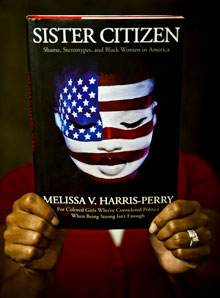Sister Citizen
Political scientist Melissa Harris-Perry explores the relationship between African American women and the stereotypes that often constrain and distort their self-image.
 |
| Although her new book is focused on African American women, Melissa Harris-Perry thinks all sorts of people will find insights into contemporary politics by reading it. (Photo by Paula Burch-Celentano) |
Drawing on literature, psychology and religion, political science professor Melissa Harris-Perry connects political realities to inner lives of African American women in Sister Citizen: Shame, Stereotypes and Black Women in America. The book, which was published in fall 2011, explores the interrelationship of race, gender and citizenship.
"I use the experiences of African American women as my point of departure for understanding democratic citizenship in the United States," she says.
Throughout the book, Harris-Perry addresses how African American women are boxed in by the stereotypes through which others see them and by the false personas that they often feel compelled to present to the world.
"The book is in many ways about how we struggle to be accurately seen in our communities, by our government, by ourselves."
An excerpt from Sister Citizen: Shame, Stereotypes and Black Women in America:
When they confront race and gender stereotypes, black women are standing in a crooked room, and they have to figure out which way is up. Bombarded with warped images of their humanity, some black women tilt and bend themselves to fit the distortion. It may be surprising that some gyrate half-naked in degrading hip-hop videos that reinforce the image of black women's lewdness. It may be shocking that some black women actors seem willing to embody the historically degrading image of Mammy by accepting movie roles where they are cast as the nurturing caretakers of white women and children. It may seem inexplicable that a respected black woman educator would stamp her foot while trying to make a point on national television, thereby reconfirming the notion that black women are irrationally angry. To understand why black women's public actions and political strategies sometimes seem tilted in ways that accommodate the degrading stereotypes around them, it is important to appreciate the structural constraints that influence their behavior. It can be hard to stand up straight in a crooked room.
|




